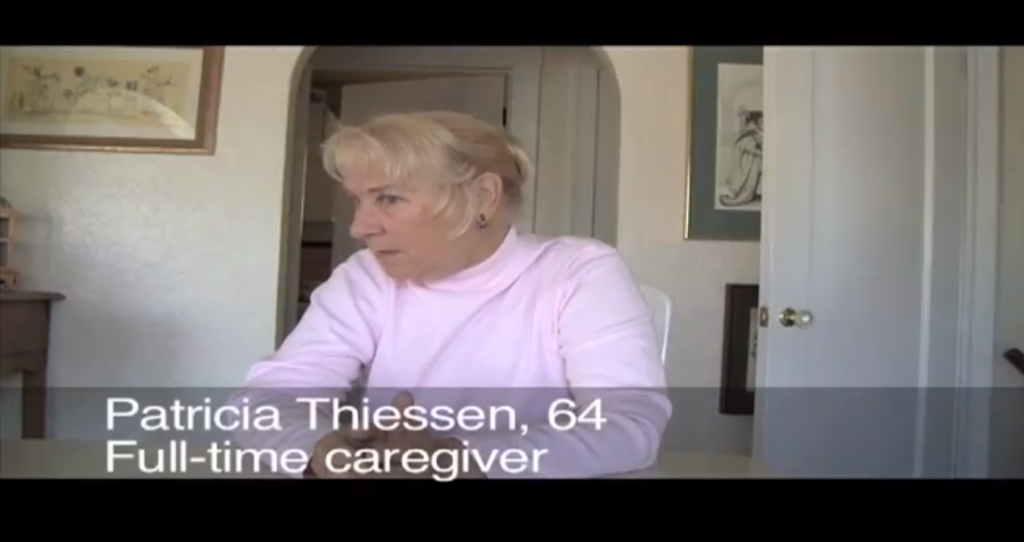Editor’s Note: This is the third in a series of articles on the Athens uninsured initiative, produced by graduate students in the Health and Medical Journalism Program at the University of Georgia. Visit the previous article by clicking on the red button to the left.)
[youtube width=”620px”]http://www.youtube.com/watch?v=lMmRTd63aao[/youtube]
Patricia Thiessen was driving in her hometown of Reno, Nev., when she suddenly lost the sight in her right eye. It returned within moments.
Six weeks later, the same thing happened to her left eye. It was obvious something was seriously wrong.
Thiessen, who does not have health insurance, went to her local hospital and took advantage of a free screening offer she had received in the mail. She discovered she was suffering from carotid artery disease, which would ultimately increase her risk of stroke. Plaque buildup in the arteries was blocking the blood flow to her brain and causing the episodes of blindness.
The hospital referred her to a cardiologist, who informed her that she would need two surgeries to unclog the arteries. The bill would be close to $60,000.
Thiessen was working part time as a cosmetologist and caring for her disabled brother and sister. “The cost of health insurance was out of my range,” she said. “It was like a thousand dollars a month.”
The high cost was because she would have to buy an individual policy, and she had a history of skin cancer. The Affordable Care Act had not fully kicked in yet, and insurance companies could still penalize people for pre-existing medical conditions.
“Literally, I would have been paying off medical bills for the rest of my life,” said Thiessen, who at the time of her vision scare was 64, a year away from qualifying for Medicare. Waiting that extra year and gambling on her eyesight wasn’t an appealing option.
Fortunately, a billing coordinator in the specialist’s office told her to call Access to Healthcare Network (AHN), a coalition of health care providers in Nevada and the state’s only nonprofit medical discount plan.
Athens will soon become the first Georgia community – in fact the first community outside Nevada – to implement a plan like the one that helped Thiessen. The Athens Health Network’s health assurance plan will launch next year.
Fast action in urgent cases
The experiences of consumers and physicians in Reno give us some idea of what to expect.
Members of the network pay a monthly fee that gives them access to a large number of specialists, clinics and hospitals where they pay cash – at deep discounts – for the care they receive.
Thiessen called AHN on a Friday afternoon, and a staff member quickly set up the two procedures she needed to restore blood flow to her brain.
The hospital charged her $800 for each procedure, performed earlier this year. Factoring in the payments to the surgeons and anesthesiologist, Thiessen paid about $4,500 total – compared to an estimated $60,000 she would have owed without AHN.
“It would have been $44,000 just for the hospital,” she said.
Thiessen is one of nearly 600,000 Nevadans without conventional health insurance, and one of roughly 8,000 who now have access to affordable care because they have joined AHN. In Georgia, an estimated 2 million people are uninsured, and in Athens about 5,000 of them would be eligible to join a plan like AHN.
As the Affordable Care Act, the 2010 federal health care law, moves forward, many Athens-area residents will still be in need of this nonprofit medical discount network, especially if Georgia does not expand its Medicaid program under the act.
Easing hassles for caregivers
When it comes to specialized care, “we are the funnel for the rest of the northern half of Nevada,” said Trevor Rice, the member services director for AHN.
Before AHN was created, “People couldn’t get specialty care at a price they could afford, so it just didn’t get done,” Rice said.
As a result, there was a “pent-up” need for care before AHN was launched seven years ago, and lots of early members needed attention from surgeons and medical specialists. But AHN’s rate of referrals for specialty care has decreased in the years since, Rice said, probably because that backlog of unaddressed problems has been cleared.
Although AHN is a “shared responsibility” model, meaning that members, while getting reduced rates, still have to pay for care, “most of our providers would probably view us as a charity program,” Rice said.
“Therefore it’s all about the relationship,” said Rice. The organization works hard to ensure that being part of AHN is as little hassle as possible for health care providers.
In Athens, an uninsured person with carotid artery disease needing immediate surgical attention, like Thiessen, would have found it nearly impossible to get surgery at an affordable price.
Since many specialists in Clarke County don’t accept patients that are uninsured or on Medicaid, many low-income patients who receive primary care at community health centers or free clinics either go without specialty care or travel long distances to get what they need.
Ian Branam is a freelance health and science writer currently pursuing a master’s in health and medical journalism at the University of Georgia. Ian has bachelor’s degrees in history and psychology from the University of Georgia. He is particularly interested in writing about public health, epidemiology, and the environment. Follow on Twitter as @ianbran6

